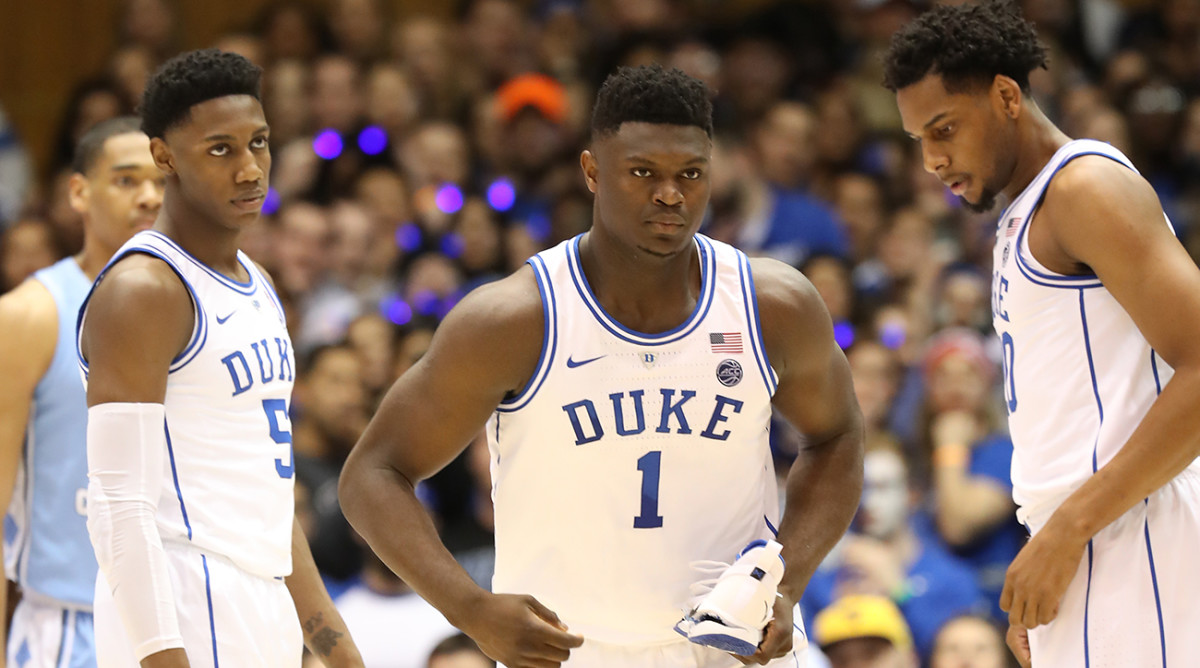The One-and-Done Debate Will Only Get Louder After Zion Williamson's Injury

MILWAUKEE — Zion Williamson goes down on Wednesday, his left foot literally bursting out of his Nike’s, his right knee wrenching, twisting ligaments in his leg and guts in NBA front offices alike and suddenly a well-worn debate is back: Should Zion even have to be there? As everyone from Barack Obama and Ken Griffey Jr. settled into seats being re-sold for as high as $3,300 a pop, we once again are wondering why the athletes who drive the revenue are not getting a nickel of it.
First, let’s stipulate: This is a problem that likely does have an expiration date. Last June, the NBA circulated a memo indicating that the league’s eligibility rules could change as early as 2021. While not specifically mentioning the one-and-done rule, there’s no question that the NBA’s hardline stance on keeping the rule it implemented in 2005 had softened, and both the league and the players union are open to eliminating it before the current collective bargaining agreement expires, in 2024. There have been some hiccups—the furnishing of medical information and participation in the draft combine are reportedly on the list—but several executives told The Crossover that they are operating under the belief that the floodgates will eventually be re-opened to high school talent.
Until then, let’s acknowledge, too, that this is a problem without a silver bullet of a solution. Pay players, you say? OK—how much? Do Duke players get more than Wake Forest? Does Zion make more than Jordan Goldwire? What about college football, with revenue and risk that dwarf basketball’s? If there is a pot of money that should be distributed, there has yet to be a clear plan presented as to how to distribute it.

There are some things the NCAA could allow, and this is where they look foolish, greedy or both. Individual sneaker deals, for starters. If Nike or Adidas or Puma want to be on Team Zion, let them. Would the integrity of the game really be tarnished by Zion having a signature shoe? Letting players cash in on their own likeness is another. Paid appearances after practice might be a little much, but how about designating certain weeks every year where players can line their pockets with camps or speaking gigs?
The NBA isn’t altruistic—college basketball is a de facto feeder system, one they don’t have to pay for—but let’s also acknowledge that the one-and-done rule has had some benefits. Among the reasons the NBA pushed for the rule more than a decade ago was a growing number of prep-to-pro busts (Kwame Brown, DeSagana Diop) while others made an even more marginal impact, or less. It’s impossible to prove, but it’s far from a stretch to believe that there have been teenagers, lots of them, who believed they were NBA-ready and were forced to go to college, where they quickly discovered they weren’t. Who knows? Maybe lives were changed for the better.
The reality is, stars like Zion may be barred from the NBA until they are a year removed from high school, but there are paths to making money—real money. A handful of players have cashed in playing overseas for a year while the G-League plans to begin offering “Select Contracts” worth $125,000 a year to high level prospects. That money still pales in comparison to a multi-million dollar NBA salary, but remember—a sneaker company eager to get in business with a Zion Williamson would undoubtedly offer significantly more just to get a player like that under contract. Again, this isn’t an argument against compensating college athletes—just noting that there are paths to making a considerable amount of money.
Duke has listed Williamson as day-to-day with a Grade-1 right knee sprain, which caused the basketball world to exhale a collective sigh of relief. Zion hasn’t solicited advice on how to proceed with the rest of the season, but that hasn’t stopped everyone from offering it. Fans have weighed in. NBA players, too. Trae Young, last year’s college basketball phenom, says Williamson should “chill” for the rest of the season. Isaiah Thomas—who has some experience expecting a financial windfall, only to see an injury make it disappear—has advised Zion to sit, too.
Kyrie Irving has been in Zion’s situation. Eight games into his freshman season at Duke, Irving suffered a toe injury that cost him the next 26. He could have shut it down. He didn’t, opting to return to play in Duke’s three tournament games, and eventually was the No. 1 pick in the 2011 NBA draft.
Irving’s advice?
“Instead of worrying about the injury and what he has to deal with, it just becomes about his future, all the questions that are asked,’’ said Irving. “So, you know, just hope he stays resilient and knows what’s important, and that’s him and his family. It’s unfortunate, especially just the situation that happened, blown out of his shoe completely. It’s not really common when you see things like that. It’s just unfortunate, especially on a big-time game like that.’’
This argument could be over sometime in the early 2020’s, but make no mistake: It will continue to rage until then. College basketball has shown no willingness to offer any kind of compensation to college stars, even as coaches' salaries balloon and FBI investigations expose the nastiness of the recruiting process. There will be another Zion, and another, and if a catastrophic injury befalls any of them, the calls for change will only get louder.
